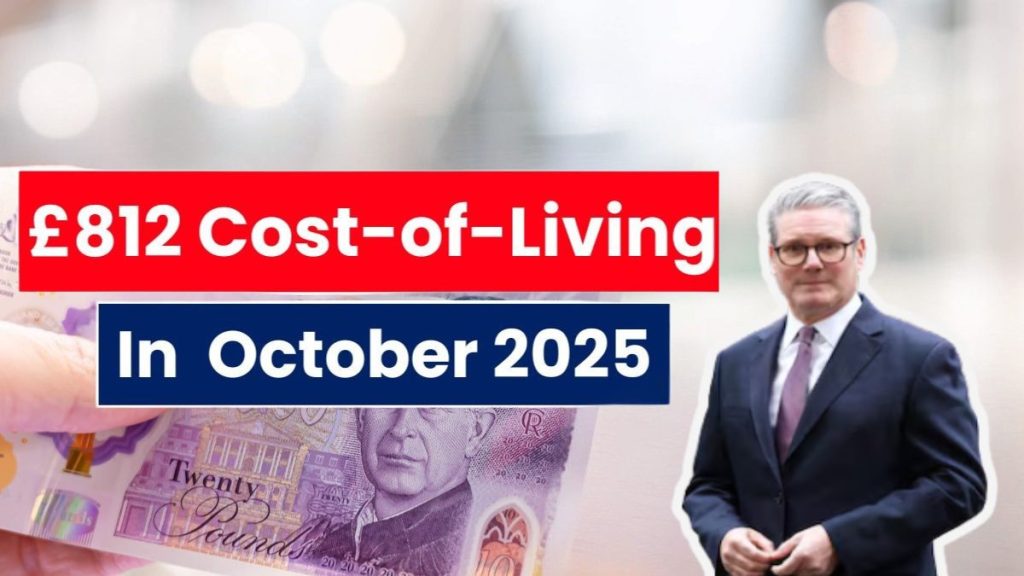The UK Government has officially confirmed a major update to the nation’s banking and cash withdrawal system, taking effect on 25 October 2025. This landmark rule will introduce a £3,000 daily limit on cash withdrawals across banks, ATMs, and post office counters.
The new policy — developed by the HM Treasury in partnership with the Financial Conduct Authority (FCA) and the Bank of England — forms part of a wider plan to improve financial transparency, reduce money laundering risks, and promote digital payments.
Officials say the change is designed to modernise the financial system without completely removing access to cash, which remains crucial for pensioners, rural residents, and small business owners.
What the New Withdrawal Rule Means
Under the new system, individuals and businesses will be restricted to a maximum withdrawal of £3,000 per day from their accounts — regardless of whether the withdrawal is made at an ATM, a bank branch, or a post office counter.
The rule applies to both personal and business accounts, with limited exceptions granted for specific, verifiable circumstances such as:
- Large property or vehicle purchases.
- Emergency medical or family situations.
- Certified business transactions requiring immediate liquidity.
The Treasury and banks will work together to ensure these exceptions are managed through enhanced verification checks and documentation to confirm the legitimacy of large cash withdrawals.
Why the Government Is Introducing the Change
Officials say the £3,000 limit aims to strike a balance between maintaining access to cash and addressing the growing concerns about financial crime and untraceable cash flows.
In recent years, UK authorities have reported a rise in money laundering, fraud, and tax evasion linked to large cash transactions. Meanwhile, the use of cash in everyday life continues to fall.
According to a 2025 report by UK Finance, more than 80% of all transactions in the UK are now digital — via cards, bank transfers, or mobile payments.
A Treasury spokesperson explained:
“This change is part of a broader effort to strengthen financial oversight and align the UK with global standards on money movement transparency. At the same time, we’re ensuring cash remains accessible to those who need it most.”
Who Will Be Affected
The new limit will affect a wide range of groups across the UK, including:
- Everyday bank customers who make regular large cash withdrawals.
- Small business owners who rely on cash-based trade.
- ATM users and post office customers withdrawing large sums.
- Pensioners and benefit recipients who still prefer to manage finances in cash.
However, most individuals who typically withdraw smaller amounts — such as £100–£500 — will experience no change in their daily banking activities. The rule primarily targets high-volume cash users and unmonitored transactions.
How to Adapt Before October 2025
To minimise disruption, the government and major banks recommend that people review their banking habits and reduce reliance on cash before the new rule takes effect.
Practical steps to prepare include:
- Set up online or mobile banking to manage transfers and payments digitally.
- Use debit or credit cards for everyday purchases and bills.
- Keep smaller amounts of cash for essentials or emergencies.
- Plan larger withdrawals in advance, contacting your bank for pre-approval if necessary.
Financial advisers stress that embracing digital payments not only boosts convenience but also enhances personal security by reducing the risk of theft or loss.
Exceptions and Special Circumstances
Although the rule sets a firm £3,000 limit, flexibility exists for legitimate needs. Customers who require higher withdrawals will be able to apply for special permission through their bank or building society.
Examples of approved exceptions include:
- Property transactions where payment must be made in cash.
- Medical or humanitarian emergencies requiring immediate funds.
- Officially documented business payments.
Banks will review such cases individually, requiring customers to provide proof such as purchase agreements, invoices, or medical documentation.
This system is intended to ensure legitimate users can still access their money while preventing the misuse of cash for illicit purposes.
Impact on Small Businesses
The introduction of a cash limit is expected to have the biggest impact on small and cash-dependent businesses — including market traders, local retailers, and small service providers.
Many of these businesses handle large amounts of cash daily, often due to customer preference or limited digital infrastructure.
Key adaptation strategies for small businesses:
- Install contactless payment systems or QR-based options.
- Maintain accurate cash flow records for bank verification.
- Educate staff on anti-fraud and secure transaction practices.
- Use bank transfers or card payments for supplier transactions instead of large cash exchanges.
While the transition may be challenging initially, financial experts argue that moving toward digital operations will improve business efficiency, reduce risk, and expand customer reach.
What Banks Are Saying
Major UK banks, including Barclays, HSBC, Lloyds, and NatWest, have expressed strong support for the new limit. They believe the reform will help protect customers while strengthening the integrity of the national banking system.
In a joint statement, the British Bankers’ Association said:
“These changes will help modernise the UK’s financial framework and reduce risks associated with untraceable transactions. Banks are working to ensure customers receive clear guidance and support during the transition.”
Banks are also increasing efforts to promote digital literacy, offering tutorials and resources for customers unfamiliar with online banking or contactless payments.
Public Reaction and Concerns
The announcement has sparked mixed reactions across the country. While some view it as a positive step toward modernisation, others see it as another move toward a cashless society that could marginalise certain groups.
Elderly citizens, rural communities, and those with limited internet access have voiced concerns about losing convenient access to cash.
Consumer rights groups, including Which? and Age UK, have called for guarantees that cash access will remain protected in all regions — especially as many towns face bank branch closures and ATM reductions.
Government’s Reassurance on Cash Access
Responding to public concern, the HM Treasury and FCA have confirmed that cash will remain legal tender in the United Kingdom.
To ensure fair access, banks and post offices will be legally required to:
- Maintain reasonable cash withdrawal facilities within every community.
- Offer free or low-cost access to cash through ATMs and branches.
- Support vulnerable customers, including elderly and disabled individuals, with tailored banking services.
The government has also pledged to publish an annual Cash Access Report to monitor the availability of withdrawal and deposit points nationwide.
How Pensioners and Benefit Claimants Will Be Affected
The Department for Work and Pensions (DWP) has reassured the public that the change will not affect how pensions or benefits are paid.
Payments will continue to be deposited directly into recipients’ accounts. However, pensioners who prefer withdrawing their full pension in cash each week will need to plan withdrawals within the £3,000 daily limit.
The DWP is encouraging pensioners to consider direct debit options for bills and regular expenses. Support will also be provided through local Post Office branches to help elderly citizens adapt to digital banking.
Expert Views on the Future of Cash
Financial analysts view the new rule as a turning point in the UK’s journey toward a cash-light economy.
Professor Mark Sanderson, an economist at King’s College London, noted:
“This reform doesn’t abolish cash, but it accelerates the shift toward a digital-first financial system. Over time, we’ll see physical currency used mainly for specific or local purposes rather than everyday trade.”
He added that this shift could ultimately reduce operational costs for banks and cut down financial crime, though it must be implemented with care to avoid excluding vulnerable populations.
Government’s Broader Financial Reform Strategy
The new withdrawal limit forms part of the government’s Financial Integrity and Modernisation Strategy, a set of initiatives to:
- Strengthen anti-money-laundering (AML) measures.
- Increase digital transaction transparency.
- Ensure inclusive financial access for citizens.
- Align the UK’s systems with international banking standards.
The reforms are also designed to complement the upcoming Digital Pound framework, which aims to integrate cash and electronic currency in a secure hybrid model by the end of the decade.
The Role of the Financial Conduct Authority (FCA)
The FCA will play a central role in enforcing and monitoring the new cash policy. Working with banks, building societies, and Post Office branches, the FCA will ensure that:
- Daily withdrawal limits are applied consistently.
- Banks provide clear customer communication.
- Vulnerable groups retain practical access to their funds.
The authority will also collect feedback from communities during the first 12 months of implementation and report findings to Parliament in 2026.
The Future of Cash in the United Kingdom
The UK is not eliminating cash — but its role is changing. As mobile payments, digital wallets, and contactless transactions dominate, the government’s goal is to create a balanced ecosystem where cash remains accessible but secure and traceable.
Experts predict that by 2030, fewer than 10% of all payments will involve physical money. However, the government insists that any future decisions about cash elimination will involve public consultation and Parliamentary review.
For now, Britons can expect a hybrid economy — one where digital convenience meets financial accountability.
Frequently Asked Questions (FAQs)
1. When will the £3,000 cash withdrawal limit take effect?
The rule will come into force on 25 October 2025, applying to all UK banks, ATMs, and post office counters.
2. Does the limit apply to both personal and business accounts?
Yes. The £3,000 cap applies across all personal and business accounts, though businesses can apply for special permissions with documentation.
3. Can I withdraw more than £3,000 in special cases?
Yes. Exceptions may be approved for legitimate needs such as property purchases, emergencies, or verified business expenses — subject to bank review.
4. Will pensioners and benefit recipients be affected?
Not directly. Payments will continue as normal, but pensioners who withdraw large cash sums must plan withdrawals within the daily limit.
5. Is the UK moving toward a cashless society?
Not entirely. The government emphasises a “cash-light” system where digital payments are encouraged but cash access remains protected under UK law.
























